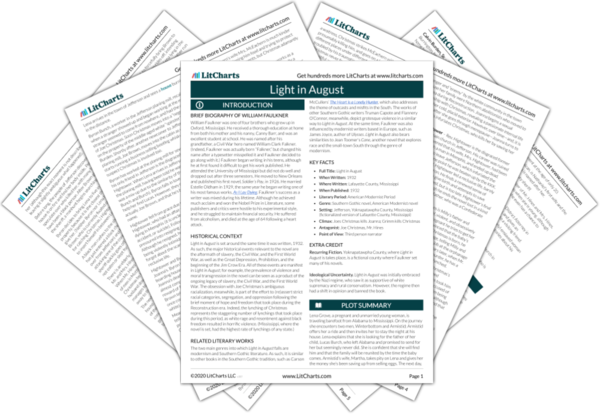Race, Gender, and Transgression
Light in August is set in the fictional town of Jefferson, Mississippi, at the beginning of the Jim Crow era, and chronicles white people’s intense anxiety about preserving white supremacy during this period of transition. Many of the characters in the novel are desperate to uphold race as a fixed and essential quality, yet other characters, like Joe Christmas—who believes he has black ancestry yet passes as white—show that race is actually an arbitrary…
read analysis of Race, Gender, and TransgressionFreedom, Discipline, and Violence
Freedom is a very important concept in Light in August. This is unsurprising, considering that the novel is set in a society still reeling from the relatively recent abolition of slavery, and one governed by strict social norms. While many of the characters seem to possess an intense desire for freedom, others seek to curtail freedom—whether their own or someone else’s. Some characters do this by enforcing the strict social codes designed to limit…
read analysis of Freedom, Discipline, and ViolenceNames and Identity
Names are very important in Light in August. More than simply a way of identifying a person, they convey information about that person’s characteristics. This suggests that people’s personalities are predetermined from the moment that they are given their name (or inherit it, in the case of surnames). At the same time, many of the characters in the novel change their names, usually as a way to reinvent themselves and escape their pasts. In a…
read analysis of Names and Identity
Strangers, Outcasts, and Belonging
The most important characters in Light in August are all strangers or outcasts in some way. This becomes particularly pronounced due to the novel’s setting of Jefferson, Mississippi, a small town where belonging and conformity are highly prized. Yet while the strangers and outcasts in the novel are often villainized for the fact that they don’t belong, in reality their presence exposes that the veneer of conformity and belonging in Jefferson is actually an illusion…
read analysis of Strangers, Outcasts, and BelongingHaunting and the Past
In Light in August, the past is not truly past, but instead a very present, powerful, and sinister aspect of life in Jefferson. This is an important trope of Southern Gothic literature, which uses haunting and repetition to depict a region still gripped by the brutal trauma of genocide, slavery, and the Civil War. By depicting the past as something that returns through haunting and repetition, Light in August highlights the futility of attempting…
read analysis of Haunting and the Past






